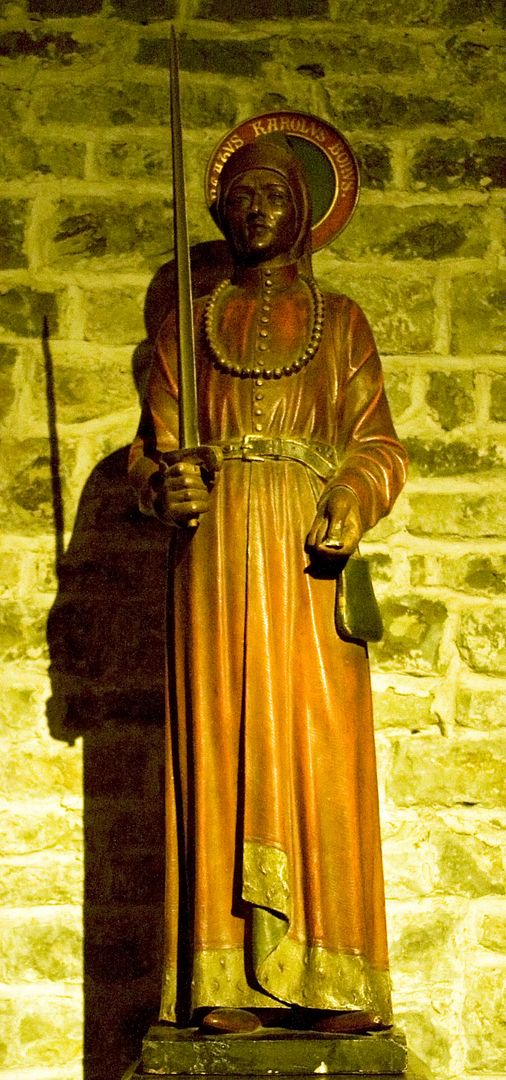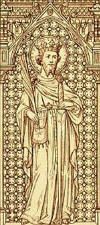Today, March 2, we celebrate the feast of Blessed Charles the Good (1083-1127), Count and Ruler of Flanders (modern day Belgium), and tireless protector of the poor and needy. Named “the Good” by popular acclaim, Charles ruled his peoples with equity, loyalty, and love, espousing the virtues of Christianity and leading many to the Lord.
Charles was born the son of Saint Canute, King of Denmark. When his father was murdered when Charles was just 5 years old, his mother took him to the court of her father, the Count of Flanders in Bruges. Charles grew up in the court, learning the life of royalty, but also maintaining daily practice, prayer, and religious observance. When he reached the age of service, Charles became a night and accompanied his uncle on the Second Crusade. Upon his return, he was placed as leader of the county of Flanders.
Count Charles led his people with a profound emphasis on justice, based upon the Holy Scriptures and teachings of Christ. Each night after dinner, he met with learned theologians who explained the Scriptures to him. He then used this knowledge to enact fair and just laws throughout the county. He forbade blasphemy, and looked with special care to those who were easily taken advantage of or exploited, including widows, the poor, and orphans. Those who were convicted of exploiting this fragile groups, Charles punished swiftly, but fairly. He led by example, expecting nothing more from his subjects than he, himself, was prepared to do.
Charles became so well loved and respected that he was pressured to assume the imperial throne when it was vacated. He, for his part, declined, preferring to spend his time caring for the people of Flanders. Charles proclaimed peace, citing “the Truce of God,” and putting to an end the frequent fighting and violence of the country. He lived without the typical pomp and luxury of royalty of the times, instead streamlining and downsizing his government to better provide for the poor. He decreased taxes on the poor and increased wages. When nobles, whose lifestyles were hurt by his decrees complained, he kindly answered them saying: "It is because I am so aware of the needs of the poor and the pride of the rich." Everyday, the poor and hungry in his kingdom were fed at his castles, especially when great famine fell across the counties in 1125.
 |
| Charles' Castle at Bruges |
Eventually, Charles the Good angered enough of his noblemen that they hatched a plot to rid themselves of the do-gooder. They found him at the Church of Saint Donatian, as was his habit, and beheaded him while he knelt in prayer before the alter of Our Lady.
The life of Blessed Charles the Good reminds us of each of our roles in promoting truth, equality, and social justice. Blessed Charles forewent the comforts and luxuries afforded to royalty to better serve his fellow man—whom he considered equal to himself. Today, we pray for justice and equity amongst the peoples of the world, and look to the Church as a leader in the promotion of human love, acceptance, and peace.
Father, you have given all peoples one common origin.
It is your will that they be gathered together
as one family in yourself.
Fill the hearts of mankind with the fire of your love
and with the desire to ensure justice for all.
By sharing the good things you give us,
may we secure an equality for all
our brothers and sisters throughout the world.
May there be an end to division, strife and war.
May there be a dawning of a truly human society
built on love and peace.
We ask this in the name of Jesus, our Lord.
Amen.
Year 2: Day 61 of 365
Prayer Intentions: Equity and Justice.
Requested Intentions: Healing (C); Restoration of marriage (F); Freedom from medical difficulties, employment, successful relationship (D); End to suffering for sick brother; reconciliation of estranged family (E); End to husband’s addiction; Improved relationship; strength (M); Successful God-centered marriage; Sacramental life (M); Healing, successful relationship (S); For successful marriage (A); For a husband’s freedom from addiction (C); Freedom from pain and illness for a friend (M); Financial freedom (J); Successful passing of occupational examination (S); Healing and conversion, sale of house (L); Occupational success for employee and colleagues (J); Employment for a son (C); Successful attainment of an important appointed position (J); Recovery from cancer for a friend (Z); For a family’s freedom from sin (M); For a daughter with Diabetes (A); Healing of a father following stroke (S).











0 comments:
Post a Comment
Thanks for leaving a comment. If you wish to submit a prayer request, however, please do so above, using the "Contact" tab.